Kathleen Jones's Blog, page 26
November 9, 2015
Remembrance DayTuesday Poem: Here Bullet by Brian Turner
HERE, BULLET
If a body is what you want,
then here is bone and gristle and flesh.
Here is the clavicle-snapped wish,
the aorta’s opened valves, the leap
thought makes at the synaptic gap.
Here is the adrenaline rush you crave,
that inexorable flight, that insane puncture
into heat and blood. And I dare you to finish
what you’ve started. Because here, Bullet,
here is where I complete the word you bring
hissing through the air, here is where I moan
the barrel’s cold esophagus, triggering
my tongue’s explosives for the rifling I have
inside of me, each twist of the round
spun deeper, because here, Bullet,
here is where the world ends, every time.
© 2005, Brian Turner
From: Here, Bullet
Publisher: Alice James Books, Farmington, ME, 2005
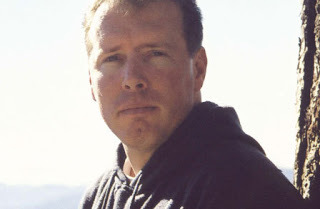
The collection Here Bullet chronicles Brian Turner's time as a serving soldier in the US army in Iraq. It records the realities of war rather than philosophical musings about the rights and wrongs of armed conflict and the poem aren't sanitized for the squeamish reader. If we allow our governments to wage war and fund our armed forces to fight then we need to know what we are sending them into.
The wonderful thing about the poems in this collection is the way the poems engage with traditional Arabic poetry - its themes and forms. There are two other collections, Phantom Noise (which deals with post-traumatic stress) and My Life as a Foreign Country.
For more about Brian Turner and his poetry click here.
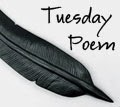 The Tuesday Poets are an international group, based in New Zealand, who aim to post a poem every Tuesday and take it in turns to edit the main website. If you'd like to see what we're all posting this week please click here to go to the Hub.
The Tuesday Poets are an international group, based in New Zealand, who aim to post a poem every Tuesday and take it in turns to edit the main website. If you'd like to see what we're all posting this week please click here to go to the Hub.
If a body is what you want,
then here is bone and gristle and flesh.
Here is the clavicle-snapped wish,
the aorta’s opened valves, the leap
thought makes at the synaptic gap.
Here is the adrenaline rush you crave,
that inexorable flight, that insane puncture
into heat and blood. And I dare you to finish
what you’ve started. Because here, Bullet,
here is where I complete the word you bring
hissing through the air, here is where I moan
the barrel’s cold esophagus, triggering
my tongue’s explosives for the rifling I have
inside of me, each twist of the round
spun deeper, because here, Bullet,
here is where the world ends, every time.
© 2005, Brian Turner
From: Here, Bullet
Publisher: Alice James Books, Farmington, ME, 2005

The collection Here Bullet chronicles Brian Turner's time as a serving soldier in the US army in Iraq. It records the realities of war rather than philosophical musings about the rights and wrongs of armed conflict and the poem aren't sanitized for the squeamish reader. If we allow our governments to wage war and fund our armed forces to fight then we need to know what we are sending them into.
The wonderful thing about the poems in this collection is the way the poems engage with traditional Arabic poetry - its themes and forms. There are two other collections, Phantom Noise (which deals with post-traumatic stress) and My Life as a Foreign Country.
For more about Brian Turner and his poetry click here.
 The Tuesday Poets are an international group, based in New Zealand, who aim to post a poem every Tuesday and take it in turns to edit the main website. If you'd like to see what we're all posting this week please click here to go to the Hub.
The Tuesday Poets are an international group, based in New Zealand, who aim to post a poem every Tuesday and take it in turns to edit the main website. If you'd like to see what we're all posting this week please click here to go to the Hub.
Published on November 09, 2015 15:30
November 6, 2015
For the Love of Books
I've had a very busy two or three weeks - flat out with workshops, publisher's deadlines, academic work, and a half term spent with my two youngest grandchildren revising my child-minding skills. There was also a whole day spent on a train (5 hours each way) for a three hour meeting in wildest Wales. But it was a good week in other ways.
It's not often that the readers of your books write to you and tell you that they liked them, but this week I've had no fewer than four letters or emails saying thank you. Staggering through the door on a wet autumn night with heavy book bags, totally exhausted, with a heap of damp mail clutched with gloves and keys, it gives you a real lift when you find, among the bills, a handwritten letter telling you how your book made someone happy.
As writers we more often have to take the knocks - the one star reviews on Amazon, critical reports from editors and agents, rejections from magazines - and so it's utterly marvelous to hear from a reader whose life you touched. It's made me realise that, as a reader, I should be more pro-active in letting the author know I rated their book. I don't get much time for reviewing these days, but I feel I should do more. It's such a wonderful morale booster! So, thank you to all those fantastic readers who took the time to make my week. One reader even sent me a photograph of his cat sleeping on the NZ edition of my Katherine Mansfield biography - brilliant! That cat has taste . . .
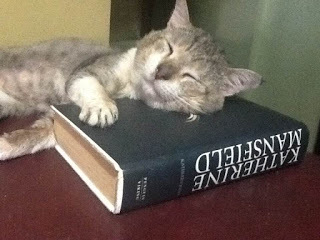
Katherine Mansfield: The Story-teller
Kindle Edition £3.32
Paperback Edinburgh University Press £15.99
Hardback Penguin £25.00
It's not often that the readers of your books write to you and tell you that they liked them, but this week I've had no fewer than four letters or emails saying thank you. Staggering through the door on a wet autumn night with heavy book bags, totally exhausted, with a heap of damp mail clutched with gloves and keys, it gives you a real lift when you find, among the bills, a handwritten letter telling you how your book made someone happy.
As writers we more often have to take the knocks - the one star reviews on Amazon, critical reports from editors and agents, rejections from magazines - and so it's utterly marvelous to hear from a reader whose life you touched. It's made me realise that, as a reader, I should be more pro-active in letting the author know I rated their book. I don't get much time for reviewing these days, but I feel I should do more. It's such a wonderful morale booster! So, thank you to all those fantastic readers who took the time to make my week. One reader even sent me a photograph of his cat sleeping on the NZ edition of my Katherine Mansfield biography - brilliant! That cat has taste . . .

Katherine Mansfield: The Story-teller
Kindle Edition £3.32
Paperback Edinburgh University Press £15.99
Hardback Penguin £25.00
Published on November 06, 2015 14:37
Poetry - is it just prose on short lines?
It's my turn to blog over at Authors Electric - this time on the subject of poetry. Does anyone know what it is?
http://www.authorselectric.blogspot.co.uk/2015/11/poetry-is-it-just-prose-on-short-lines.html
This is one of the trickiest questions on the Eng Lit syllabus - What is Poetry? As a published poet I should know, but ......
I’ve just done an interview on this for a former member of Authors Electric - Roz Morris, who hosts the ‘Undercover Soundtrack’ blog, runs a fiction course for the Guardian Masterclass series and produces a radio programme called ‘So You Want to be a Writer?’. Her questions meant that I had to think quite hard about the craft of poetry which, we discovered in discussion, isn’t that much different from the craft of fiction.
Poetry is a bit more concerned with the rhythm and music of language than fiction usually is; the musicality of words and their percussion. This means that sometimes the syntax can get overlooked in the sheer exuberance of the lines. Poets are allowed to have a bit more fun with words than prose writers. . . .
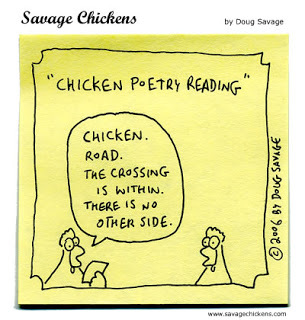 Read More ......
Read More ......
http://www.authorselectric.blogspot.co.uk/2015/11/poetry-is-it-just-prose-on-short-lines.html
This is one of the trickiest questions on the Eng Lit syllabus - What is Poetry? As a published poet I should know, but ......
I’ve just done an interview on this for a former member of Authors Electric - Roz Morris, who hosts the ‘Undercover Soundtrack’ blog, runs a fiction course for the Guardian Masterclass series and produces a radio programme called ‘So You Want to be a Writer?’. Her questions meant that I had to think quite hard about the craft of poetry which, we discovered in discussion, isn’t that much different from the craft of fiction.
Poetry is a bit more concerned with the rhythm and music of language than fiction usually is; the musicality of words and their percussion. This means that sometimes the syntax can get overlooked in the sheer exuberance of the lines. Poets are allowed to have a bit more fun with words than prose writers. . . .
 Read More ......
Read More ......
Published on November 06, 2015 14:14
October 26, 2015
Tuesday Poem: Above Armageddon by Tim Jones
From the mezzanine, Armageddon Sci-Fi convention, Wellington, 2008
In my day
there was less money to be parted from.
Now this whole place
is a trading floor,
awash in cash, cleavage,
cosplay and testosterone.
*
Jesus, cross in hand,
blessed the sellers of Devil’s Dice.
Japanese Death in a long white wig,
totes his scythe past stands of PS3s.
John Rhys Davies’ booming voice
echoes from a distant room.
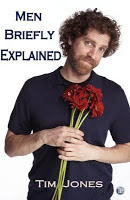
*
The reef fish of the market
swim before my eyes.
My son goes darting
among the channelled shoals.
Where will all this money
wash up, do you think, in the end?
© Tim Jones,
Men Briefly Explained, Interactive Press, 2011
Tim lives in New Zealand, writes both prose and poetry in the 'Speculative Poetry and Fiction' categories and has had a great deal of success with both. This poem is more personal. I love the description of a visit to a Sci-Fi convention with his young son. It's very understated - when Tim mentions 'reef fish' I immediately think of sharks, swarming around to part the young and enthusiastic from their money. And we all know where it will 'wash up in the end'.
Men Briefly Explained has been one of my favourite collections, so I was very happy to write some blurb for the cover when it was published in 2011.
"Tim Jones writes about how it feels to be a man, of male relationships - father, son, brother, friend, lover, husband - exploring territory that men traditionally don't talk about, saying what is often unsaid, confronting stereotypes, and genetic imperatives. He writes with a blend of economy, humour and compassion that is rare in poetry, often finding the unexpected phrase or an unusual, but exact, image to surprise and illuminate. This poetry is how New Women want their New Men to be - strong, sensitive and empathetic!"
More recently Tim has edited 'Stars Like Sand' a collection of Australian Speculative Poetry with PS Cottier, and has just published a novella called 'Landfall' with Paper Road Press, also available as an e-book from Amazon.
Tim has an excellent Blog at Books in the Trees.
The Tuesday Poets are an international group who try to post a poem every Tuesday and take it in turns to edit the main hub. If you'd like to see what the others are posting today, please click on this link to visit the Tuesday Poem site.
In my day
there was less money to be parted from.
Now this whole place
is a trading floor,
awash in cash, cleavage,
cosplay and testosterone.
*
Jesus, cross in hand,
blessed the sellers of Devil’s Dice.
Japanese Death in a long white wig,
totes his scythe past stands of PS3s.
John Rhys Davies’ booming voice
echoes from a distant room.

*
The reef fish of the market
swim before my eyes.
My son goes darting
among the channelled shoals.
Where will all this money
wash up, do you think, in the end?
© Tim Jones,
Men Briefly Explained, Interactive Press, 2011
Tim lives in New Zealand, writes both prose and poetry in the 'Speculative Poetry and Fiction' categories and has had a great deal of success with both. This poem is more personal. I love the description of a visit to a Sci-Fi convention with his young son. It's very understated - when Tim mentions 'reef fish' I immediately think of sharks, swarming around to part the young and enthusiastic from their money. And we all know where it will 'wash up in the end'.
Men Briefly Explained has been one of my favourite collections, so I was very happy to write some blurb for the cover when it was published in 2011.
"Tim Jones writes about how it feels to be a man, of male relationships - father, son, brother, friend, lover, husband - exploring territory that men traditionally don't talk about, saying what is often unsaid, confronting stereotypes, and genetic imperatives. He writes with a blend of economy, humour and compassion that is rare in poetry, often finding the unexpected phrase or an unusual, but exact, image to surprise and illuminate. This poetry is how New Women want their New Men to be - strong, sensitive and empathetic!"
More recently Tim has edited 'Stars Like Sand' a collection of Australian Speculative Poetry with PS Cottier, and has just published a novella called 'Landfall' with Paper Road Press, also available as an e-book from Amazon.
Tim has an excellent Blog at Books in the Trees.
The Tuesday Poets are an international group who try to post a poem every Tuesday and take it in turns to edit the main hub. If you'd like to see what the others are posting today, please click on this link to visit the Tuesday Poem site.
Published on October 26, 2015 16:30
October 24, 2015
Autumn in the Lake District
 The view from the footbridge outside the MillIt's that time of year again, approaching Hallowe'en - the colourful preamble to the dark, never-ending winter months of the far north. This year Autumn has been spectacular, with long sunny days, very little wind or rain to blast the leaves from the trees and they are gradually beginning to burn like torches beside the river.
The view from the footbridge outside the MillIt's that time of year again, approaching Hallowe'en - the colourful preamble to the dark, never-ending winter months of the far north. This year Autumn has been spectacular, with long sunny days, very little wind or rain to blast the leaves from the trees and they are gradually beginning to burn like torches beside the river. 
These are the old copper beeches that line the lane that runs up from the river to the hamlet of Bongate - named because the bonded slaves that served the castle used to live here, probably in dreadful hovels. It's a little more genteel these days.

This year the swans have raised five cygnets, all as big as their parents now, though still with their grey colouring, and yesterday I saw them begin their journey down the river - the last I will see of them until the parents (hopefully) return next spring to raise another brood.
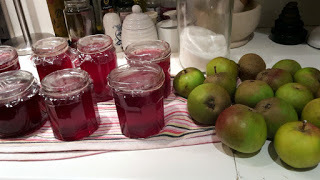 And I've been busy, picking the green windfalls out of the grass and making them into jelly with some blackberries sourced up the lane. There's nothing more satisfying than eating food you haven't had to pay for and that you know is free from any artificial preservatives or pesticides.
And I've been busy, picking the green windfalls out of the grass and making them into jelly with some blackberries sourced up the lane. There's nothing more satisfying than eating food you haven't had to pay for and that you know is free from any artificial preservatives or pesticides.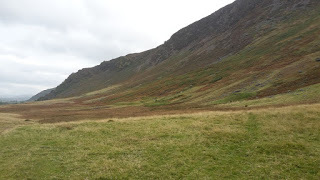
It's also been a busy week, workwise, with visits to York, Huddersfield, and across the Lake District to the west coast. The fells are looking beautiful - the coarse grass and bracken beginning to turn that wonderful fox colour. This is Mosedale, near to Caldbeck, where my father had a small fell farm. My native territory and it always makes my heart beat a little faster.
It's getting to the time of year to curl up with a good book. What am I reading? I've just bought Dundee poet Don Paterson's '40 Sonnets' (shortlisted for the TS Eliot award), which I'm enjoying immensely. I don't like all of them - they're a mixed bag of more traditional and the very experimental. But any poet who writes a poem about an unborn child hearing his mother's "loud heart like a landlord at the door", and who can produce couplets like this, definitely gets my vote:
'What is the sound that fades up from the hiss,
like a glass some random downdraught had set ringing,
now full of its only note, its lonely call,
drawing on its song to keep it singing?"
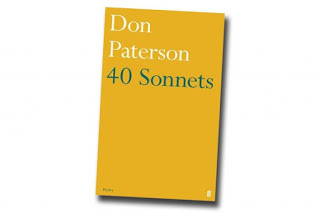
Published on October 24, 2015 11:46
October 19, 2015
Tuesday Poem: Vana's Life by Helen Rickerby
as directed by Krzysztok Kieslowski
and Ray Harryhausen
Between each step
is a space of one hundred years
or five seconds
I breathe in
in one millennium and exhale
in the next
I am walking backwards along the sand
of Island Bay
so I can trace my own footprints and, behind
the island, I can see all the way back
across the wine-dark ocean
past the ships in full sail
carrying heroines, monsters
escaped husbands and adventuring wives
to the beginning of it all:
a small old woman
knitting the whole tale
on needles made of bone
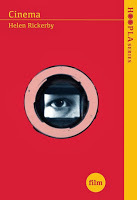
© Helen Rickerby,
from Cinema, published by Makaro Press, Wellington NZ.
Cinema is a very interesting collection, looking at people and places through the lens of a film camera. In the poems there is the idea that ‘at the cinema, we do not think, we are thought’. Everything is manufactured, directed. In this collection Helen says that she ‘writes about the personal using the lens of a camera and the world of cinema through unfiltered eyes’. When I asked her about this particular poem she said, 'After a humorous comment from my friend Chris (immortalised/stolen in 'Chris's life, as directed by Ken Russell'), I got interested in the idea of what it might be like if our lives were directed by film directors. The characters in [Cinema] are, to varying degrees, based on my friends, and I was aiming to explore the occupations of the different film-makers. Each one kind of opened out from there. 'Vana's life' was the last of these that I wrote. Vana lives between New Zealand and Greece, and so I tried to capture that, along with my interest in myth and feminist revisioning.'
In this poem I love the idea of walking, literally, backwards through time, my life directed by Kieslowski and Harryhausen. Kieslowski was a Polish film director famous for the surreal Three Colors Trilogy (which I loved) and the Double Life of Veronique. Harryhausen was a special effects producer who invented 'Dynamation', a kind of stop model animation for film.
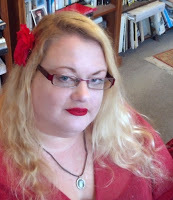
Helen Rickerby is a New Zealand poet, co-editor of Jaam and publisher of Seraph Press. She was the recipient of a Creative New Zealand award in 2014. She blogs at Winged Ink and her latest blog is about Alice Oswald.
The Tuesday Poets are an international group who try to post a poem every Tuesday and take it in turns to edit the main hub. If you'd like to see what the others are posting, please click on this link to take you to the Tuesday Poem site.
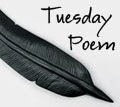
and Ray Harryhausen
Between each step
is a space of one hundred years
or five seconds
I breathe in
in one millennium and exhale
in the next
I am walking backwards along the sand
of Island Bay
so I can trace my own footprints and, behind
the island, I can see all the way back
across the wine-dark ocean
past the ships in full sail
carrying heroines, monsters
escaped husbands and adventuring wives
to the beginning of it all:
a small old woman
knitting the whole tale
on needles made of bone

© Helen Rickerby,
from Cinema, published by Makaro Press, Wellington NZ.
Cinema is a very interesting collection, looking at people and places through the lens of a film camera. In the poems there is the idea that ‘at the cinema, we do not think, we are thought’. Everything is manufactured, directed. In this collection Helen says that she ‘writes about the personal using the lens of a camera and the world of cinema through unfiltered eyes’. When I asked her about this particular poem she said, 'After a humorous comment from my friend Chris (immortalised/stolen in 'Chris's life, as directed by Ken Russell'), I got interested in the idea of what it might be like if our lives were directed by film directors. The characters in [Cinema] are, to varying degrees, based on my friends, and I was aiming to explore the occupations of the different film-makers. Each one kind of opened out from there. 'Vana's life' was the last of these that I wrote. Vana lives between New Zealand and Greece, and so I tried to capture that, along with my interest in myth and feminist revisioning.'
In this poem I love the idea of walking, literally, backwards through time, my life directed by Kieslowski and Harryhausen. Kieslowski was a Polish film director famous for the surreal Three Colors Trilogy (which I loved) and the Double Life of Veronique. Harryhausen was a special effects producer who invented 'Dynamation', a kind of stop model animation for film.

Helen Rickerby is a New Zealand poet, co-editor of Jaam and publisher of Seraph Press. She was the recipient of a Creative New Zealand award in 2014. She blogs at Winged Ink and her latest blog is about Alice Oswald.
The Tuesday Poets are an international group who try to post a poem every Tuesday and take it in turns to edit the main hub. If you'd like to see what the others are posting, please click on this link to take you to the Tuesday Poem site.

Published on October 19, 2015 15:30
October 17, 2015
Hurray! A Non-Fiction Author Wins the Nobel Prize for Literature.
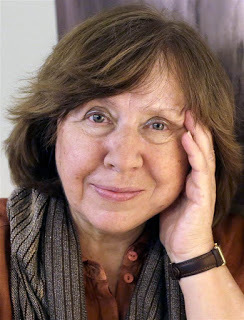 The very human face of Svetlana Alexievich
The very human face of Svetlana AlexievichSvetlana Alexievich, who has just beaten Haruki Murakami, Ngugi wa Thiong’o, and Jon Fosse to the Nobel prize for literature, is an unusual choice. Not only is she a woman (there haven’t been very many), but she is not a poet or a novelist. It cheered me up to learn that she was a non-fiction author.
Her speciality is what her French editor describes as “oral history . . . about nostalgia for the Soviet Union. She went around Russia interviewing people after the fall of the Soviet Union, in an attempt to surmise what the collective post Soviet psyche is. As with all her books, it’s really harrowing – a story about loss of identity, about finding yourself in a country which you don’t recognise any more. It’s a micro-historical survey of Russia in the second half of the 20th century, and it goes up to the Putin years.”
Alexievich isn’t simply a recorder of social documentary. She listens to people, takes down what they say and arranges their ‘polyphonic voices’ to tell a story. It’s a technique she developed under the influence of the Belorusian writer Ales Adamovich, who developed a genre which he variously called the “collective novel”, “novel-oratorio”, or “people talking about themselves”. Svetlana Alexievich has made this into an art form.
It has always made me angry that non-fiction has been excluded from many literary prizes and awards because it is regarded as ‘non-creative’. Biography and autobiography are art forms just as novels and short stories and poems are. They take just as much skill to construct. Somehow, as a writer, you are valued less if you write non-fiction. Hopefully this award may change some minds.
One of Alexievich’s most acclaimed books is called ‘Voices From Chernobyl’, in which Alexievich interviews hundreds of those affected by the nuclear disaster, from a woman holding her dying husband despite being told by nurses that “that’s not a person anymore, that’s a nuclear reactor” to the soldiers sent in to help, angry at being “flung ... there, like sand on the reactor”. This is an extract which will give you an idea of her style.
'A policeman is walking alongside a woman who carries a basket of eggs. He walks with her to make sure that she buries the eggs in the ground because they are radioactive. They buried milk, they buried meat, they buried bread; it was like an endless funeral procession for inanimate objects. Thousands of soldiers sliced off the top layer of the soil, which had been contaminated, and they buried it. They took ground and they buried it in the ground. And everyone who was involved turned into a philosopher because there was nothing in the human past that enabled us to deal with this situation.'
Part of what makes her prose so good is the type of question that Alexievich asks. “I don’t ask people about socialism, I ask about love, jealousy, childhood, old age, music, dances, hairstyles. The myriad sundry details of a vanished way of life. This is the only way to chase the catastrophe into the framework of the mundane and attempt to tell a story."
She approaches her work as a novelist does.
“It never ceases to amaze me how interesting ordinary, everyday life is. There are an endless number of human truths … History is only interested in facts; emotions are excluded from its realm of interest. It’s considered improper to admit them into history. I look at the world as a writer, not strictly an historian. I am fascinated by people.”
Sadly, Svetlana hasn’t been translated into English much. One of her editors said that it was difficult to get publishers in the west to take a risk on this kind of book, however well written. Now that she’s won the Nobel apparently that’s all going to change. I permit myself a cynical moment and pour another glass of wine.
The Nobel will help Svetlana's political position too. Russia doesn’t look favourably on her work. Her first book on women in war ‘War’s Unwomanly Face’ was censored in Russia under Gorbachev and she is seen by some as a ‘Russia hater’. She was born in Ukraine and lives in Belarus but sees herself part of Russian culture. Svetlana also sounds very ordinary - she was doing the ironing when she got the telephone call telling her she had won!
I’m looking forward to being able to read her work whole, rather than just extracts.
Previous female recipients of the Nobel Prize for Literature since 1909 - some of whom have now slipped from view. If you’d like to know more about them click on this link.
Alice Munro
Herta Muller
Nadine Gordimer
Wislawa Szymborska
Elfriede Jelinek
Toni Morrison
Doris Lessing
Pearl Buck
Nelly Sachs
Gabriela Mistral
Sigrid Undset
Grazia Deledda
Selma Lagerlof
With thanks to the Guardian, Washington Post, Slate and official Nobel site for information.
Published on October 17, 2015 14:15
Hurray! A Non-Fiction Authors Wins the Nobel Prize for Literature.
 The very human face of Svetlana Alexievich
The very human face of Svetlana AlexievichSvetlana Alexievich, who has just beaten Haruki Murakami, Ngugi wa Thiong’o, and Jon Fosse to the Nobel prize for literature, is an unusual choice. Not only is she a woman (there haven’t been very many), but she is not a poet or a novelist. It cheered me up to learn that she was a non-fiction author.
Her speciality is what her French editor describes as “oral history . . . about nostalgia for the Soviet Union. She went around Russia interviewing people after the fall of the Soviet Union, in an attempt to surmise what the collective post Soviet psyche is. As with all her books, it’s really harrowing – a story about loss of identity, about finding yourself in a country which you don’t recognise any more. It’s a micro-historical survey of Russia in the second half of the 20th century, and it goes up to the Putin years.”
Alexievich isn’t simply a recorder of social documentary. She listens to people, takes down what they say and arranges their ‘polyphonic voices’ to tell a story. It’s a technique she developed under the influence of the Belorusian writer Ales Adamovich, who developed a genre which he variously called the “collective novel”, “novel-oratorio”, or “people talking about themselves”. Svetlana Alexievich has made this into an art form.
It has always made me angry that non-fiction has been excluded from many literary prizes and awards because it is regarded as ‘non-creative’. Biography and autobiography are art forms just as novels and short stories and poems are. They take just as much skill to construct. Somehow, as a writer, you are valued less if you write non-fiction. Hopefully this award may change some minds.
One of Alexievich’s most acclaimed books is called ‘Voices From Chernobyl’, in which Alexievich interviews hundreds of those affected by the nuclear disaster, from a woman holding her dying husband despite being told by nurses that “that’s not a person anymore, that’s a nuclear reactor” to the soldiers sent in to help, angry at being “flung ... there, like sand on the reactor”. This is an extract which will give you an idea of her style.
'A policeman is walking alongside a woman who carries a basket of eggs. He walks with her to make sure that she buries the eggs in the ground because they are radioactive. They buried milk, they buried meat, they buried bread; it was like an endless funeral procession for inanimate objects. Thousands of soldiers sliced off the top layer of the soil, which had been contaminated, and they buried it. They took ground and they buried it in the ground. And everyone who was involved turned into a philosopher because there was nothing in the human past that enabled us to deal with this situation.'
Part of what makes her prose so good is the type of question that Alexievich asks. “I don’t ask people about socialism, I ask about love, jealousy, childhood, old age, music, dances, hairstyles. The myriad sundry details of a vanished way of life. This is the only way to chase the catastrophe into the framework of the mundane and attempt to tell a story."
She approaches her work as a novelist does.
“It never ceases to amaze me how interesting ordinary, everyday life is. There are an endless number of human truths … History is only interested in facts; emotions are excluded from its realm of interest. It’s considered improper to admit them into history. I look at the world as a writer, not strictly an historian. I am fascinated by people.”
Sadly, Svetlana hasn’t been translated into English much. One of her editors said that it was difficult to get publishers in the west to take a risk on this kind of book, however well written. Now that she’s won the Nobel apparently that’s all going to change. I permit myself a cynical moment and pour another glass of wine.
The Nobel will help Svetlana's political position too. Russia doesn’t look favourably on her work. Her first book on women in war ‘War’s Unwomanly Face’ was censored in Russia under Gorbachev and she is seen by some as a ‘Russia hater’. She was born in Ukraine and lives in Belarus but sees herself part of Russian culture. Svetlana also sounds very ordinary - she was doing the ironing when she got the telephone call telling her she had won!
I’m looking forward to being able to read her work whole, rather than just extracts.
Previous female recipients of the Nobel Prize for Literature since 1909 - some of whom have now slipped from view. If you’d like to know more about them click on this link.
Alice Munro
Herta Muller
Nadine Gordimer
Wislawa Szymborska
Elfriede Jelinek
Toni Morrison
Doris Lessing
Pearl Buck
Nelly Sachs
Gabriela Mistral
Sigrid Undset
Grazia Deledda
Selma Lagerlof
With thanks to the Guardian, Washington Post, Slate and official Nobel site for information.
Published on October 17, 2015 14:15
October 14, 2015
Katherine Mansfield's Birthday
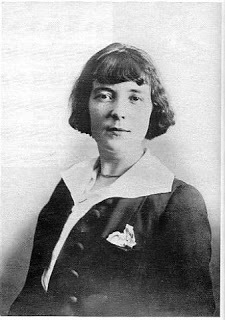
Today is Katherine Mansfield's birthday - 14th October, 1888. She was one of the most stunning writers of the twentieth century - of short stories, letters and journals. Some of the latter are her best writing. This is an extract from one of her journals, written in October 1922, when she was facing death from tuberculosis.
'I want the power to live a full, adult, living breathing life in close contact with what I love - the earth and the wonders thereof, the sea, the sun. All that we mean when we speak of the external world. . . I want, by understanding myself, to understand others. I want to be all that I am capable of becoming so that I may be - (and here I have stopped and waited and waited and it's no good - there's only one phrase that will do) a child of the sun. . . I want a garden, a small house, grass, animals, books, pictures, music. And out of this - the expression of this - I want to be writing. (Though I may write about cabmen. That's no matter.) But warm, eager living life - to be rooted in life - to learn to desire, to know, to feel, to think, to act. That is what I want. And nothing less. That is what I must aim for."
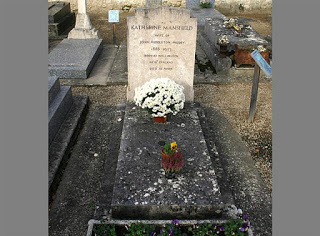
Katherine Mansfield died less than three months later at Fontainebleau near Paris.
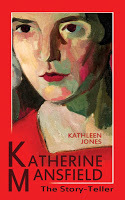
Katherine Mansfield: The Storyteller by Kathleen Jones
published by Penguin NZ and by Edinburgh University Press
E-book by The Book Mill
Available through all good book retailers and Amazon
Published on October 14, 2015 14:49
October 5, 2015
Tuesday Poem: Kitty's Bar, Victoria BC
On Screen One the Ducks are challenging the Black Hawks
on ice, while Pacific Hold-em Poker is dealing a hand
on Screen Two, and Cat Stevens is shadowing the moon
on the music track and Venus Williams is being thrashed
on Screen Three by a young tennis hopeful from Florida.
The girl behind the bar is telling a customer about
a relationship with an Ex who threatened her children
and the new boyfriend who’s afraid of commitment.
Outside, the night is closing down the harbour
as the last seaplane skitters to a pontoon.
I eat my fries in a bubble of silence.
Black Hawks five, Ducks two, the hand to beat
is a straight flush, Williams is forty love down
and the girl behind the bar is still waiting for it.
© Kathleen Jones
This is a - sort of - sonnet! I like fiddling around with contemporary variations and I was in a culture whose poetry uses narrative repetitions instead of rhyme to provide the rhythm. I wrote it in Victoria, British Columbia, eating alone in a bar with five screens broadcasting different programmes, muzak blasting out of the ceiling and some interesting conversations going on around me. It was all surreal.
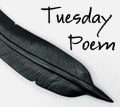 The Tuesday Poets are an international group who try to share a poem every Tuesday on their own blogs and take it in turns to edit the main website. This week's editor is Australian poet P.S. Cottier, featuring a poem by her fellow country-person Janette Pieloor. Take a look at the Tuesday Poem site and check out what the other Tuesday Poets are posting.
The Tuesday Poets are an international group who try to share a poem every Tuesday on their own blogs and take it in turns to edit the main website. This week's editor is Australian poet P.S. Cottier, featuring a poem by her fellow country-person Janette Pieloor. Take a look at the Tuesday Poem site and check out what the other Tuesday Poets are posting.
on ice, while Pacific Hold-em Poker is dealing a hand
on Screen Two, and Cat Stevens is shadowing the moon
on the music track and Venus Williams is being thrashed
on Screen Three by a young tennis hopeful from Florida.
The girl behind the bar is telling a customer about
a relationship with an Ex who threatened her children
and the new boyfriend who’s afraid of commitment.
Outside, the night is closing down the harbour
as the last seaplane skitters to a pontoon.
I eat my fries in a bubble of silence.
Black Hawks five, Ducks two, the hand to beat
is a straight flush, Williams is forty love down
and the girl behind the bar is still waiting for it.
© Kathleen Jones
This is a - sort of - sonnet! I like fiddling around with contemporary variations and I was in a culture whose poetry uses narrative repetitions instead of rhyme to provide the rhythm. I wrote it in Victoria, British Columbia, eating alone in a bar with five screens broadcasting different programmes, muzak blasting out of the ceiling and some interesting conversations going on around me. It was all surreal.
 The Tuesday Poets are an international group who try to share a poem every Tuesday on their own blogs and take it in turns to edit the main website. This week's editor is Australian poet P.S. Cottier, featuring a poem by her fellow country-person Janette Pieloor. Take a look at the Tuesday Poem site and check out what the other Tuesday Poets are posting.
The Tuesday Poets are an international group who try to share a poem every Tuesday on their own blogs and take it in turns to edit the main website. This week's editor is Australian poet P.S. Cottier, featuring a poem by her fellow country-person Janette Pieloor. Take a look at the Tuesday Poem site and check out what the other Tuesday Poets are posting.
Published on October 05, 2015 15:30



